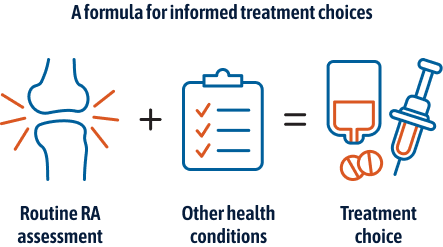RA is an autoimmune disease that causes inflammation in your joints. It can cause pain, swelling, stiffness, and reduced mobility. RA is a chronic illness, which means it doesn't go away. Over time, it may lead to permanent joint damage and physical disability. If you've been diagnosed, treatment may help. Learn more about how ORENCIA may help
RA is an autoimmune disease, meaning your immune system overreacts and attacks the healthy tissues in your own body by mistake. In RA, your immune system may target the lining of the joints, also known as the synovium.
The exact cause of RA is unknown. RA may be influenced by many risk factors, including genes, infection, hormonal changes, or environmental factors. Find out more about RA
Yes, ORENCIA studies have included people with a range of health factors, including advanced age, diabetes, cardiovascular disease, high blood pressure, and high cholesterol. These studies did not evaluate the safety or effectiveness of ORENCIA in patients with other health conditions. Talk to your doctor about how these factors might influence your treatment plan with ORENCIA.
RA affects the joints in your body, so it can have many symptoms, including joint pain and reduced mobility. Learn more about RA
If RA is left untreated, it can cause permanent joint damage and loss of function, making everyday tasks difficult. The chronic inflammation may also lead to serious complications, such as heart disease, lung problems, and increased chances of getting infections. Early treatment is crucial to controlling symptoms, protecting joints, and preventing long-term health risks.
Work with your doctor to consider factors like your symptoms, disease severity, and overall health. Since RA is different for everyone, and not all treatments work the same way, understanding what makes your condition unique can help guide your personalized treatment plan. Your doctor may recommend a combination of medications, lifestyle changes, and regular monitoring to find the most effective approach for you.
When discussing RA treatment with your doctor, you may want to share details about your symptoms, how they affect your daily life, and any concerns you have about your current treatment plan.
Depending on your individual needs, you may ask questions like, "What are my treatment options?" or "How can we tailor a plan to fit my needs?" Don’t hesitate to ask about the benefits and risks of different treatments and how they align with your health goals.












